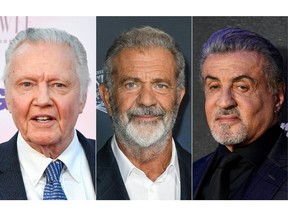Trump plans to sit down with film industry to discuss tariffs: ‘I want to make sure they’re happy’
'I’m not looking to hurt the industry; I want to help the industry'

Article content
Donald Trump says that he will meet with moviemakers and studio heads to discuss his plan to slap 100% tariffs on foreign-made films.
“I’m not looking to hurt the industry; I want to help the industry,” he said, according to CNBC.
“We’re going to meet with the industry. I want to make sure they’re happy with it, because we’re all about jobs,” Trump told reporters at the Oval Office. “Hollywood doesn’t do very much of that business. They have the nice sign and everything’s good, but they don’t do very much.”
In a post to his Truth Social page Sunday evening, Trump said he plans to impose a 100% tariff on foreign-made Hollywood movies, a move that would rock Canada’s multibillion-dollar film and television industry.
“The Movie Industry in America is DYING a very fast death. Other Countries are offering all sorts of incentives to draw our filmmakers and studios away from the United States. Hollywood, and many other areas within the U.S.A., are being devastated,” Trump wrote.
Calling foreign film production “a National Security threat,” Trump declared that films shot outside of the U.S. are a form of “messaging and propaganda!”
Trump provided no details on how his tariffs would be implemented, but U.S. Commerce Secretary Howard Lutnick responded to the president’s bombshell announcement by saying, “We’re on it.”
The tariff idea, CNBC reported, came from actor Jon Voight, who Trump tapped, along with Sylvester Stallone and Mel Gibson, to help devise a plan to bring business back to Hollywood.

But Trump downplayed the idea that taxing movies shot outside the U.S. was a certainty.
Meanwhile, Voight tried to soften Trump’s fiery social media post that sent the stocks of entertainment companies tumbling Monday. “We look forward to working with the administration, the unions, studios, and streamers to help form a plan to keep our industry healthy and bring more productions back to America,” Voight said in a statement.
“By creating the right environment through smart incentives, updated policies, and much-needed support, we can ensure that American production companies thrive, more jobs stay here at home, and Hollywood once again leads the world in creativity and innovation,” he added.
White House spokesman Kush Desai said in a statement that “no final decisions on foreign film tariffs have been made.”
Still, many Hollywood projects are shot in Canada, with Amazon-MGM (The Boys, The Expanse, Reacher and The Handmaid’s Tale), Paramount (Star Trek) and Netflix (The Umbrella Academy, Fubar and Ginny & Georgia) utilizing studios in Toronto.
In Ontario, major Hollywood studios and streamers helped lift business in the province to the tune of $3.15 billion in 2022 with more than 35,000 people employed in business.
In 2023, Ontario’s film and television industry contributed $1.8 billion to the provincial economy.
But in an interview with Postmedia, Canadian producer Robert Lantos, who has worked with David Cronenberg, Istvan Szabo and Atom Egoyan, among others, downplayed Trump’s rhetoric saying his ultimatum is “much ado about nothing.”
“First of all, administering it would be virtually impossible to measure,” Lantos said in a phone interview. “What would you base the tariff on since the (filming is taking place) outside the U.S. but most of it is done by Americans? The directors, actors, department heads, most of them are Americans. So, are you having tariffs on Americans? … It’s a case of a dog barking. I don’t think it will have the slightest impact.”
Meanwhile, Noah Segal, the co-president of Canadian distributor Elevation Pictures, added that he can’t see how any sort of tariff could be applied and that implementing one would not only have a “major impact on the production services” but also be “impossible to administer.”
“Service businesses and IP businesses are almost impossible to tariff because of the nature of the product. It’s not like a plastic toy that’s manufactured and shipped on a boat. It’s completely different,” he said in a phone interview Tuesday.
“What they’re suggesting is a tariff on all things made up here,” he continued. “Most films are not made in the United States, so therefore there would be a tariff on those films … It would add to their costs and the price for those movies to release into the marketplace would go up. All it would do would just increase the cost (to buy) a movie and that cost would be passed on to the consumers, either as a higher price for streamers or we’d have to make more money in theatres.”
A tariff, Segal believes, could lead to less movies being made. “Not only would there be less movies made, because the margins are low as it is … distributors around the world would release less because they wouldn’t be able to afford these extra costs, which no one budgeted for.”
Still, Segal calls Trump’s desire to see more productions shoot in the U.S. a “reasonable idea.”
“He has recognized that American production of films has decreased dramatically … I can see what he’s trying to do,” he said. “But what he has to focus on is coming up with some sort of value proposition to bring back producing films in the United States … I suspect when the smoke clears, he’ll come up with some other way to attract business back to the United States.”
Elevation also produces its own films, which it then sells worldwide. Segal thinks there’s an opportunity for Canadian creatives to make more “commercial Canadian fare.”
“Films like Paw Patrol, Infinity Pool and BlackBerry, which (Elevation) made, we can make those as Canadians. If he’s going to put up a border, it’s not about pushing back in terms of tariff wars. It’ll just be an opportunity to make great content,” he said.













Postmedia is committed to maintaining a lively but civil forum for discussion. Please keep comments relevant and respectful. Comments may take up to an hour to appear on the site. You will receive an email if there is a reply to your comment, an update to a thread you follow or if a user you follow comments. Visit our Community Guidelines for more information.